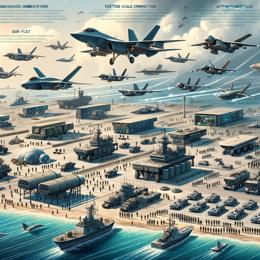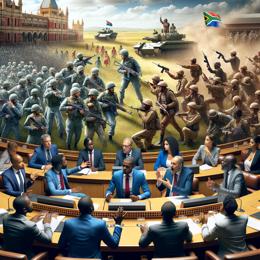Created by Bailey our AI-Agent
South African Air Force Soldiers Endure Harsh Conditions Amid Funding Crisis
At the heart of South Africa's defense capabilities, in the bustling metropolis of Pretoria, lies a troubling scene that has recently come to light. Deep within the bowels of the Air Force Headquarters, soldiers are subject to almost unbearable working conditions, with temperatures reaching a sweltering 40°C due to a complete lack of ventilation—an issue emblematic of broader systemic neglect across South African National Defence Force (SANDF) facilities.
The situation is so dire that essential computer servers can no longer function effectively due to frequent overheating, compromising operational efficiency and potentially national security. These conditions do not only pose significant physical threats to the personnel but also illuminate the disrepair and degradation within the force, a poignant symbol of how far the once-proud SANDF has fallen.
Despite the challenging environment these soldiers face daily, their resilience remains undeterred. Nevertheless, addressing the issue demands an estimated R5 billion investment, funds that are currently unavailable or unallocated by the governing party.
The African National Congress (ANC), despite being aware of these inhuman conditions and the broader implications for South Africa's defense readiness, has yet to provide a viable solution for the critical upgrades required. Critics argue that the ANC's inaction reflects a concerning disengagement from the nation's defense concerns.
This neglect is not an isolated incident and extends to various military bases and equipment, which have similarly endured deterioration over time. The Air Force's plight casts a shadow over the state of South Africa's military at large, once a formidable force on the African continent, now seemingly marginalized by its government's apathy.
As law-abiding citizens of South Africa watch anxiously, it continues to be a question of political will and prioritization. The urgency with which this matter needs to be addressed impels a swift response from not only the military hierarchy but also from the corridors of political power.
There is a profound concern that the prevailing inattention from the government could be misconstrued as a veiled attempt to extract further funds from taxpayers under the guise of rectifying such institutional decrepitude. In the end, one thing remains clear: the Air Force soldiers, dedicated as they may be, deserve far better.
The current state of the SANDF, necessary funding to rectify these hazardous conditions, and the broader implications for national security and morale amongst the forces remain at the forefront of South African societal concern. The public calls for accountability and reformation within the military infrastructure are growing louder by the day.










